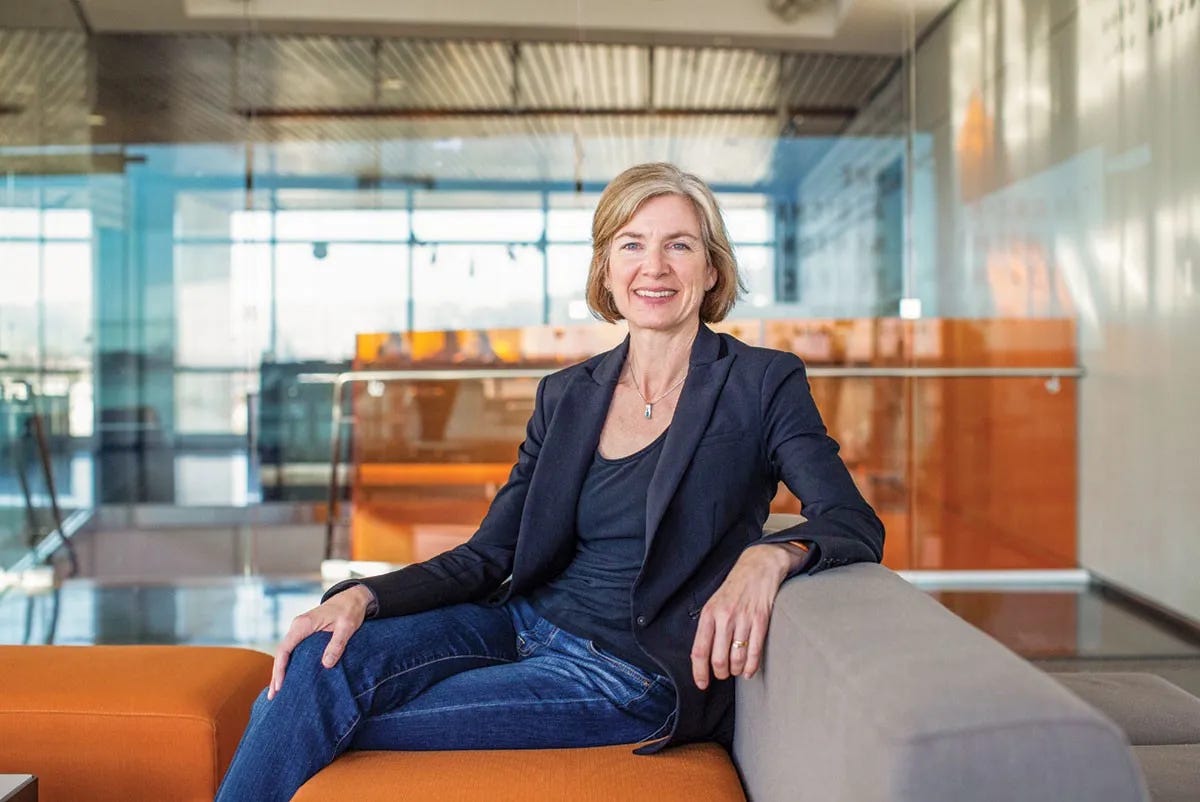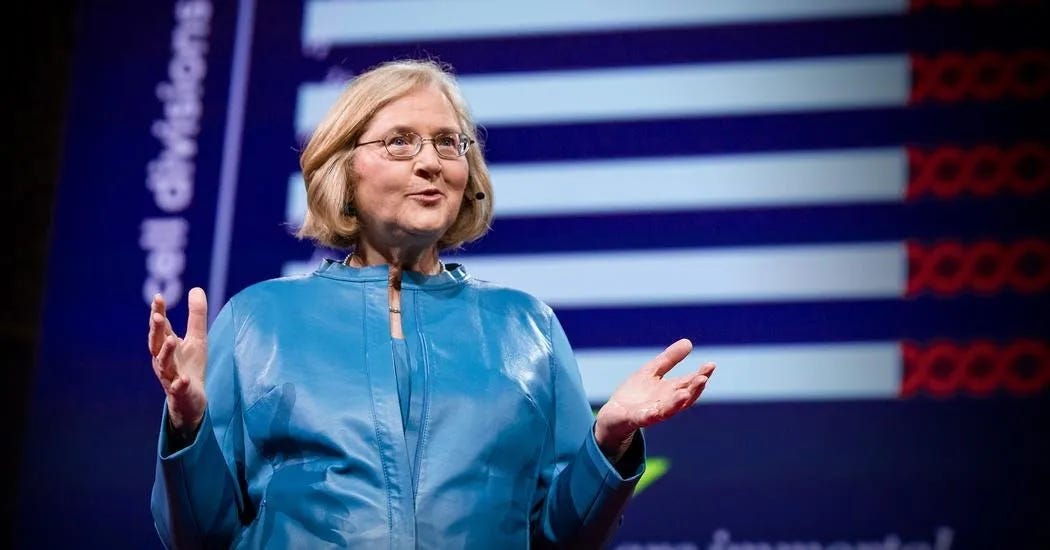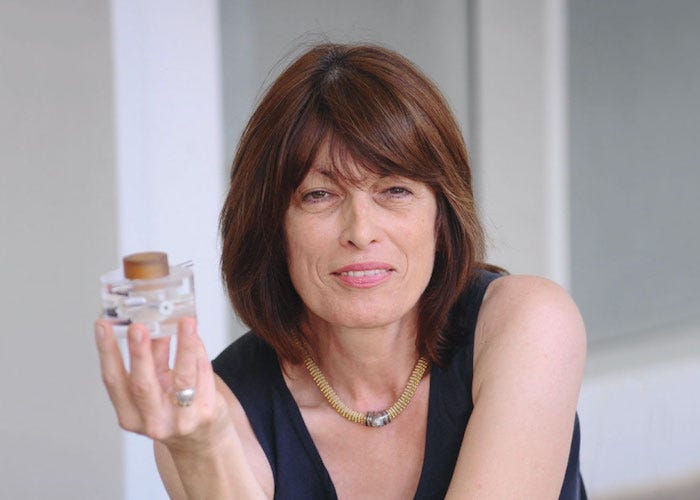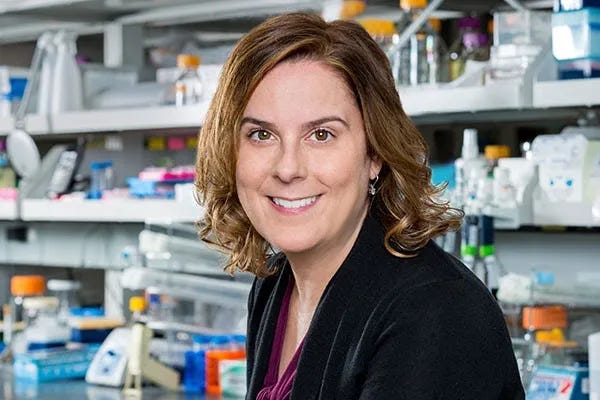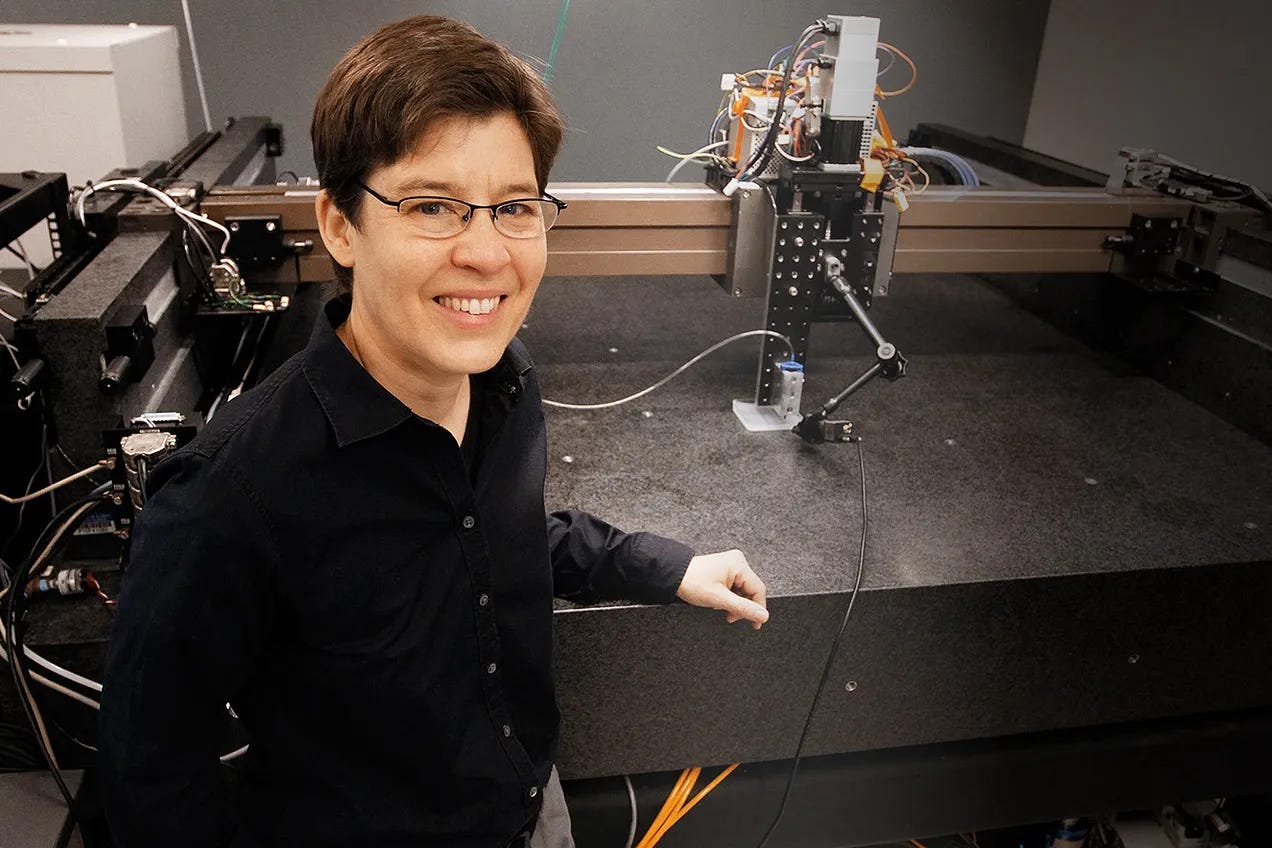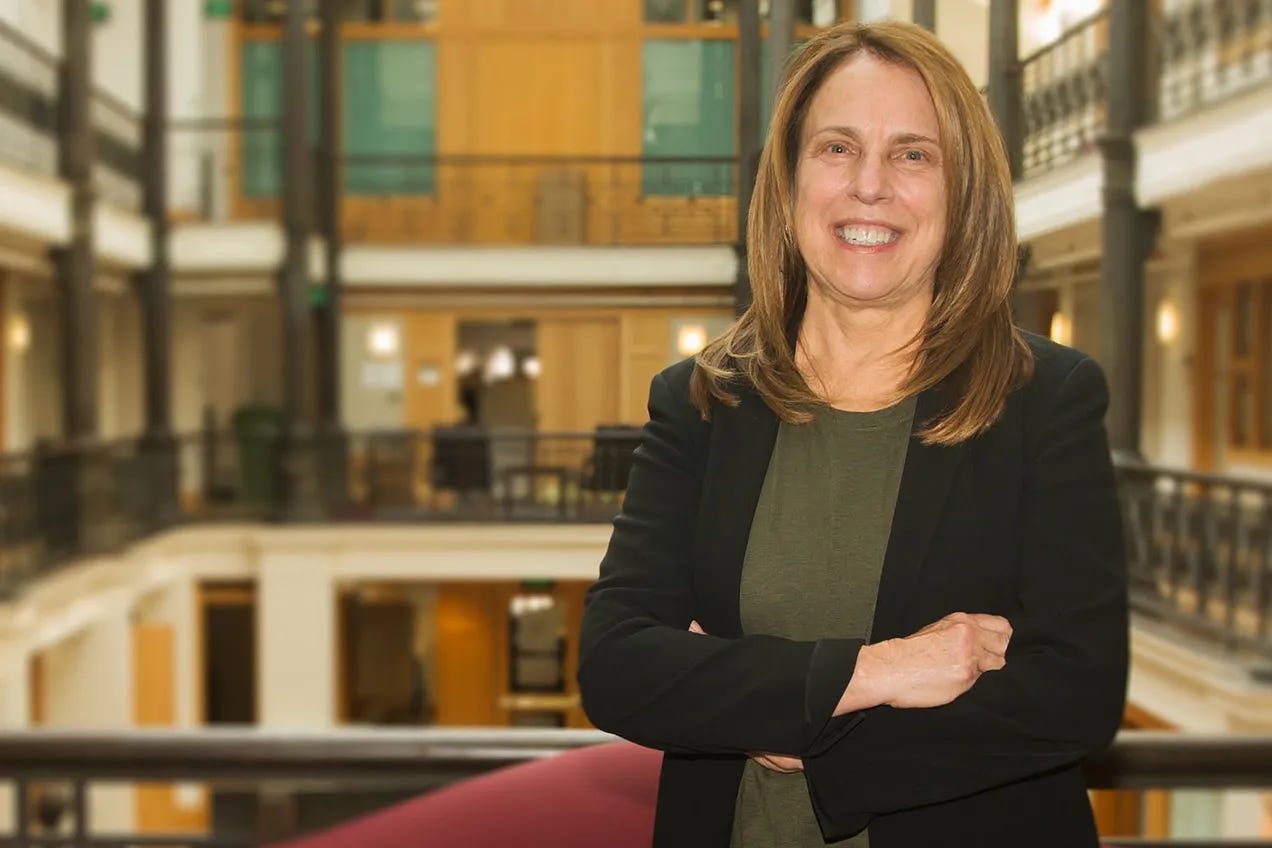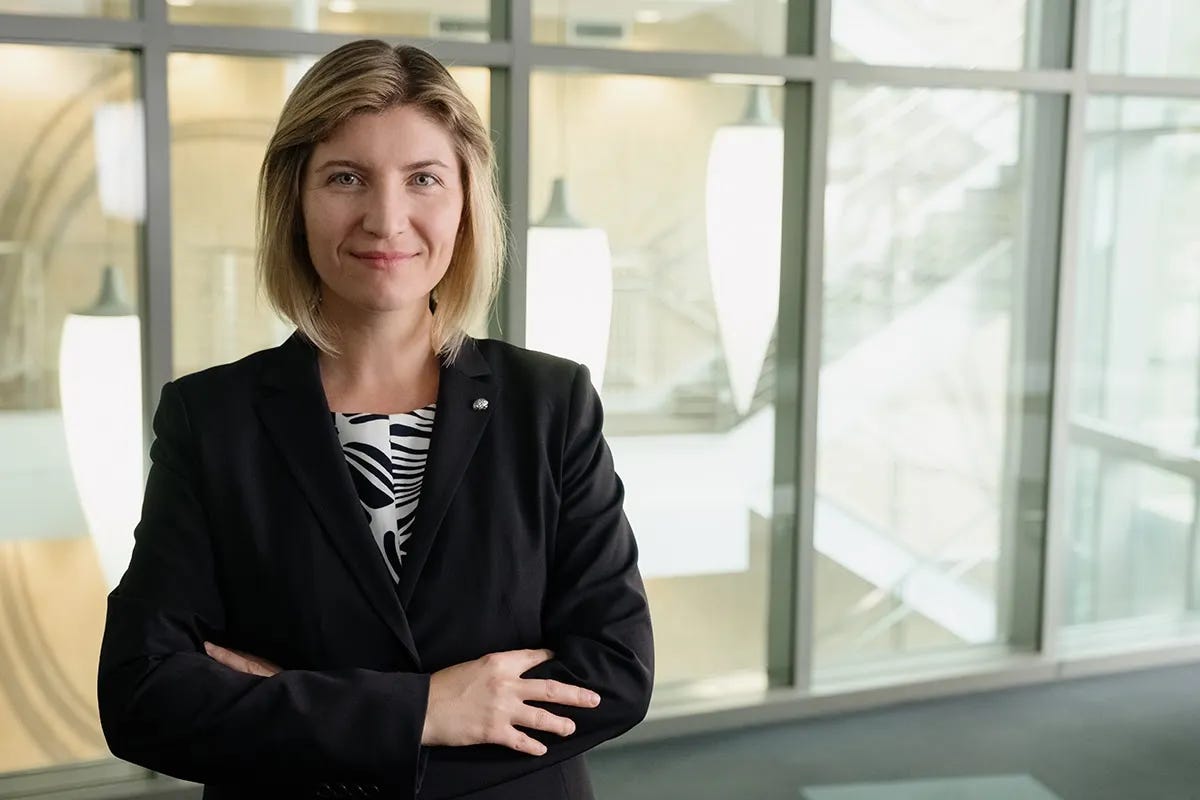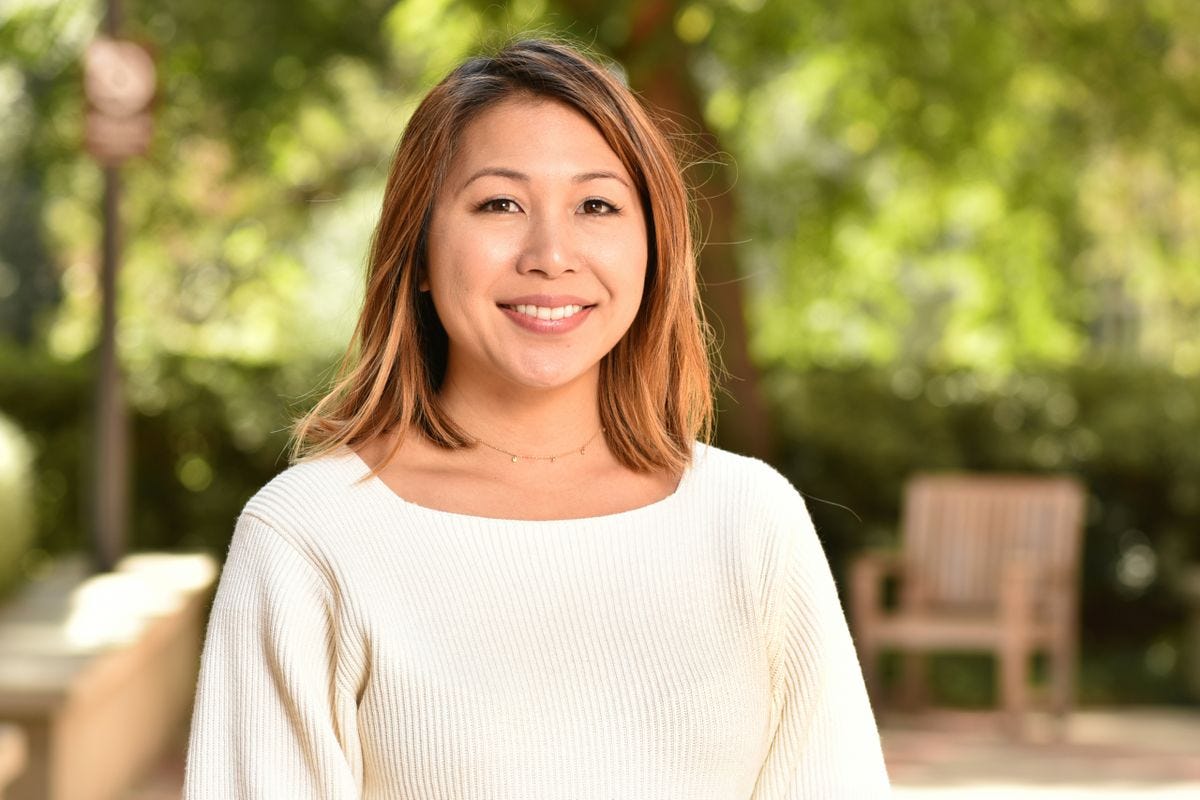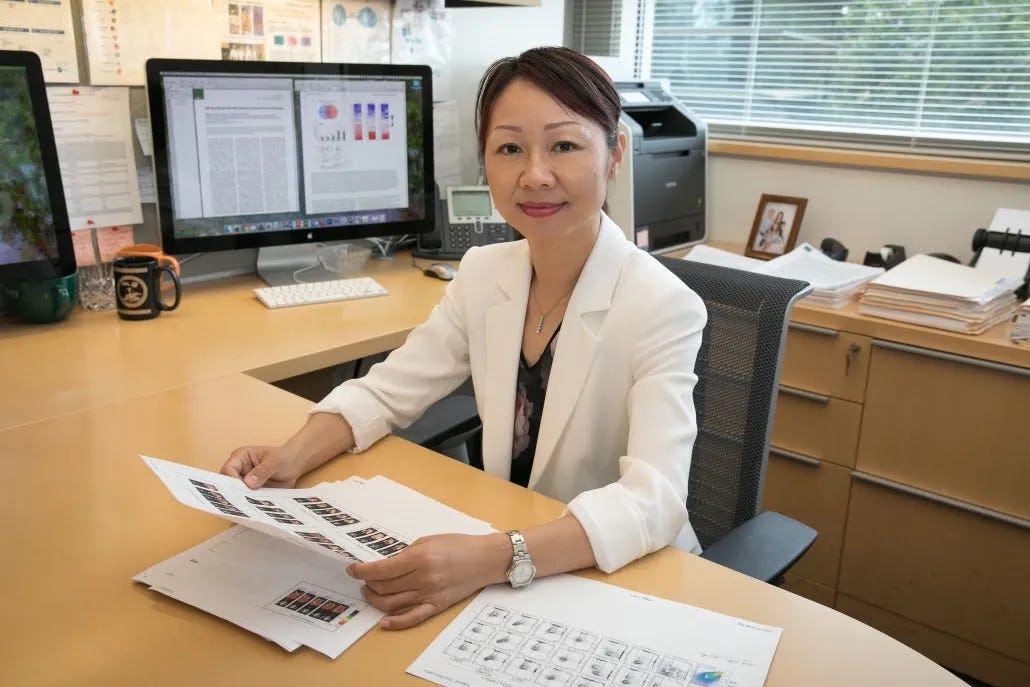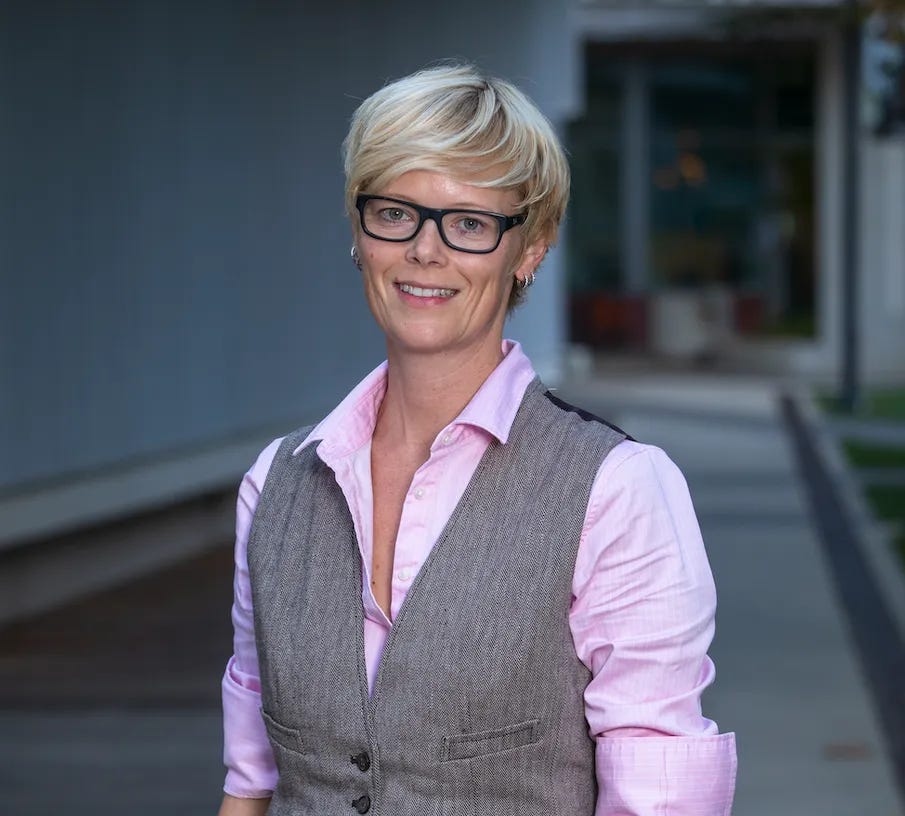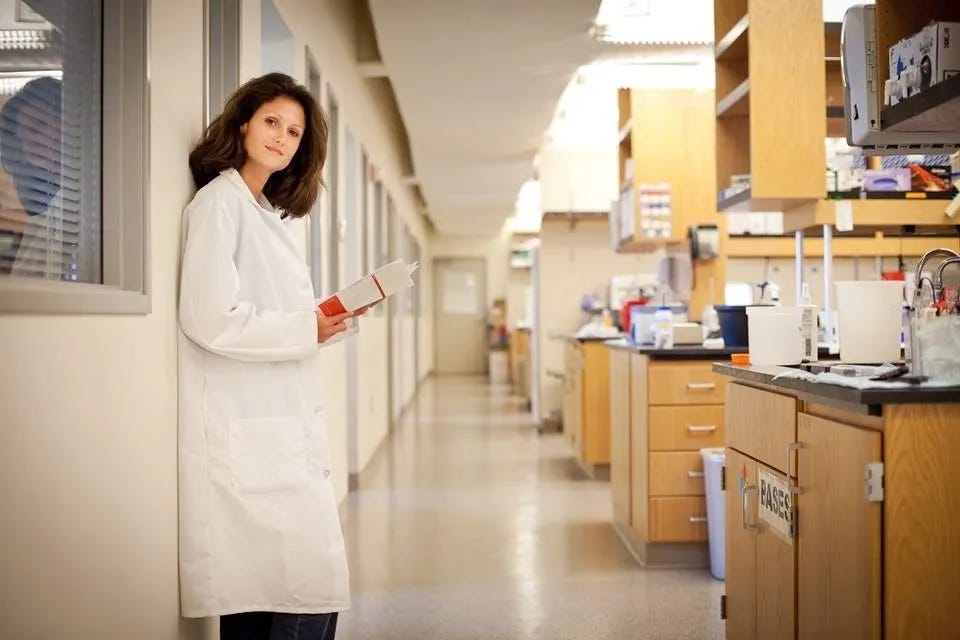Beaker List🔬: Top Women in Academic Entrepreneurship (2023 Edition)
Top 23 Women in Academic Entrepreneurship
BIOS: Nucleus of Life Science Innovation 🚀
JOBS
BIOS Talent: Find Jobs @ Breakout TechBio Startups — Search Jobs 🚀
Post Jobs: Add Your Startup to BIOS Talent — Post Now 🎉
Students: Join Alix Ventures Fellowship — Join Now 🧬
BIOS Contributor: Share Your Thought Leadership — Join Now🔬
CONTENT & COMMUNITY
BIOS Daily: Join 25K+ Subscribers Following TechBio — Sign Up 🔥
BIOS Insider: Premium TechBio Thought Leadership — Sign Up ✨
BIOS Commons: World’s Largest #TechBio Community — Join Now 🎉
INVEST
BIOS Angels: 1st TechBio Angel Investing Syndicate — Join Now 🌟
Alix Limited: Invest in Breakout TechBio Startups — Learn More 🧠
By:
Alix Ventures: Supporting Early Stage Life Science Startups Engineering Biology to Drive Radical Advances in Human Health
Overview
Behind every transformative technology is a team of brilliant scientists and researchers. Academic research in particular is a driving force for technological innovation. Here, we have identified a ‘Midas List’ of researchers who have pioneered highly transformative technologies that have translated to the clinic. Using venture backed startups as a primary guide along with other impact metrics such as patents, citations, and thought leadership, the following professors have demonstrated patient impact, providing significant contributions to the startup ecosystem.
The Life Sciences ecosystem is experiencing unprecedented innovation, and academic entrepreneurs are at the forefront of this change. Women’s History Month is a time to celebrate women past and present from all walks of life. In honor of International Women’s Day 2023, we at BIOS have the pleasure of putting together the “Top 23 Women in Academic Entrepreneurship” that have truly changed the life sciences ecosystem as we know it.
In honor of International Women’s Day 2023 taking place on 3 / 8 / 23, this list features 3 categories to commemorate the date…
3: Stars Amongst Stars - 3 star academic entrepreneurs who have changed the face of research & impacted patients on the highest of levels ❤️
8: Leading Innovators - 8 academic entrepreneurs who are on the cutting edge of life sciences research 🔬
23: Entrepreneurs to Follow - 23 of today’s top translational researchers 🎉
These women are pioneers shaping translational research and inspiring today's medical miracles, demonstrating patient impact. Through their work, these women are shaping the future of medicine and inspiring the next generation of academic entrepreneurs. From groundbreaking discoveries to entrepreneurial leadership, this article showcases in alphabetical order the impressive accomplishments of these pioneering women and their vital role in the Life Science startup landscape.
3: Stars Amongst Stars
Jennifer Doudna, Carolyn Bertozzi, & Frances Arnold
Carolyn Bertozzi
Carolyn Bertozzi is the Anne T. and Robert M. Bass Professor of Chemistry and Professor of Chemical & Systems Biology and Radiology (by courtesy) at Stanford University, and an Investigator of the Howard Hughes Medical Institute. She is the inventor of “bioorthogonal chemistry”, a class of chemical reactions compatible with living systems that enable molecular imaging and drug targeting. She also runs the Bertozzi Group, which develops chemical tools to study the glycobiology underlying diseases such as cancer, inflammation, tuberculosis and most recently COVID-19.
Bertozzi's research interests span the disciplines of chemistry and biology. She invented the concept of “bioorthogonal chemistry” and has widely applied such reactions to study biological processes and build new types of molecular therapeutics. As well, her lab studies the roles of cell surface glycosylation in human health and disease. Her lab focuses on profiling changes in cell surface glycosylation associated with cancer, inflammation and bacterial infection, and exploiting this information for development of diagnostic and therapeutic approaches, most recently in the area of immuno-oncology.
Bertozzi has been recognized with many honors and awards for both her research and teaching accomplishments. She is an elected member of the National Academy of Sciences, the National Academy of Medicine, and the German Academy of Sciences Leopoldina, and she is a Foriegn Fellow of the Royal Society, UK. Her efforts in undergraduate education have earned her the UC Berkeley Distinguished Teaching Award and the Donald Sterling Noyce Prize for Excellence in Undergraduate Teaching. Some awards of note include the Lemelson-MIT award for inventors, Ernst Schering Prize, MacArthur Foundation Fellowship, the ACS Award in Pure Chemistry, and the 2022 Nobel Prize in Chemistry.
Several of the technologies developed in the Bertozzi lab have been adapted for commercial use leading to the founding of: Redwood Bioscience (Acquired by Catalent), Enable Biosciences, Palleon Pharmaceuticals, InterVenn Bio, OliLux Bio, Grace Science, Lycia Therapeutics, GanNA Bio, & Virsti Therapeutics.
Bertozzi is also a member of the Board of Directors of OmniAb.
“Stanford has a truly unique ecosystem where innovation and entrepreneurship are intertwined with fundamental and translational science, providing an exciting environment for research and education.”
— Carolyn Bertozzi
Learn more about Carolyn’s work on BIOS Podcast: Listen Now
Frances Arnold
Frances Arnold is the Director of the Donna and Benjamin M. Rosen Bioengineering Center and Linus Pauling Professor of Chemical Engineering, Bioengineering, and Biochemistry. Arnold conducted the first directed evolution of enzymes, which are proteins that catalyze chemical reactions. Her findings led her to become a 2018 Nobel Laureate in Chemistry. The uses of her results include more environmentally friendly manufacturing of chemical substances, such as pharmaceuticals, and the production of renewable fuels. Arnold's current research at her lab, the Arnold Group, is focused on repurposing diverse existing proteins and their promiscuous functions for new chemistries, generating catalysts for ncAA formation, and designing new ML-based approaches for directed evolution.
Arnold is a member of the board of directors of Alphabet, Illumina, Generate Bio, National Resilience, & Altos Labs. She is a co-founder of Gevo, Provivi, & Aralez Bio.
“Caltech has a remarkable culture of believing anything is possible—no problem is too hard. That culture produces world-changing discoveries and fearless entrepreneurs.”
- Frances Arnold
Jennifer Doudna
Jennifer Doudna is a biochemist and professor at UC Berkeley best known for discovering CRISPR in 2012. Doudna was awarded the Nobel Prize in Chemistry in 2020 for her discovery and role in developing gene editing technologies. Doudna holds a B.S. in Chemistry from Pomona College and a Ph.D. in Biochemistry from Harvard University. She has been at UC Berkeley since 2002, where she has since pioneered work in RNA, including CRISPR. In 2015, Doudna published a framework to safeguard the genomes of human embryos against modification. At Berkeley, Doudna directs the Innovative Genomics Institute, holds the Li Ka Shing Chancellor’s Professorship in Biomedicine and Health, and is the chair of the Chancellor’s Advisor Committee on Biology. Her lab now focuses on obtaining a mechanistic understanding of biological processes involving RNA. Her current work can be seen here.
Doudna has founded numerous life sciences businesses, including Caribou Biosciences, Scribe Therapeutics, Mammoth Biosciences, Editas Medicine, & Intellia Therapeutics.
8: Leading Innovators
Christina Smolke
Christina Smolke is a professor of Bioengineering and Chemical Engineering. Smolke is known for pioneering the design and application of a broad class of RNA molecules, called RNA devices. Her laboratory, Smolke Lab, is applying these technologies to addressing key challenges in cellular therapeutics, targeted molecular therapies, and green biosynthesis strategies.
Christina is an inventor on 15 issued patents and has co-founded two companies based on technologies developed in her research group: Chimera Bioengineering & Antheia.
Elizabeth Blackburn
Elizabeth Blackburn is Morris Herztein Professor of Biology and Physiology in the Department of Biochemistry and Biophysics at the University of California, San Francisco, is a leader in the area of telomere and telomerase research. Elizabeth Blackburn, PhD, won the Nobel Prize in Physiology or Medicine in 2009 for discovering the molecular nature of telomeres, the ends of chromosomes that serve as protective caps essential for preserving genetic information, and for co-discovering telomerase, an enzyme that maintains telomere ends. In addition to the Nobel Prize, Blackburn has received nearly every major award in science, including the Lasker, Gruber and Gairdner prizes. She was named to the TIME 100 in 2007, the magazine’s yearly list of the most influential people in the world. Her research program, the Blackburn Lab, focuses on telomeres - the structures stabilizing the ends of the eukaryotic chromosomes, and the enzyme telomerase.
Aside from Blackburn’s numerous patents and awards, she is also the scientific co-founder of Telome Health.
Gordana Vunjak-Novakovic
Gordana Vunjak-Novakovic is a University Professor (the first engineer in the history of Columbia to receive this highest distinction), the Mikati Foundation Professor of Biomedical Engineering and Medical Sciences, Professor of Dental Medicine, and directs the Tissue Engineering Resource Center and Columbia’s Center for Dental and Craniofacial Research. Vunjak-Novakovic’s research interest is focused on tissue engineering, where her lab has pioneered the development of innovative technologies for engineering functional human tissues and organs.
Vunjak-Novakovic is a founder of four biotech companies based on advances in regenerative medicine and bioengineering: epiBone, Tara Biosystems (Acquired by Valo Health in 2022), Xylyx, and Immplacate.
Learn more about Gordana’s work on BIOS Frontier Science: Listen Now
Jennifer Cochran
Jennifer Cochran is the Shriram Chair and Professor of Bioengineering and Chemical Engineering at Stanford University. Her research interests include protein-based drug discovery and development for applications in oncology and regenerative medicine. Her lab, the Cochran Lab, focuses on translating basic science discoveries from bench to bedside; several of the designer proteins created in her lab are at various stages of commercialization and clinical translation.
In 2017, Cochran co-founded Lagunita Biosciences, a healthcare investment company and incubator that creates and grows early stage companies to commercialize impactful translational science. During this time, she co-founded several biotech companies, including xCella Biosciences (Acquired by Ligand Pharmaceuticals) and Nodus Oncology, and has served in various executive roles in these organizations.
Jennifer Lewis
Jennifer Lewis is the Hansjörg Wyss Professor of Biologically Inspired Engineering at the Harvard John A. Paulson School of Engineering and Applied Sciences. Lewis is best known for her pioneering contributions to the programmable assembly of soft functional, structural, and biological materials. The Lewis lab focus areas include Adaptive Material Technologies, Bioinspired Robotics, Biomimetic Microsystems, Systems Biology, and Programmable Nanomaterials.
Lewis has authored more than 150 papers, 30 patents, & co-founded multiple companies including Voxel8.
Pam Silver
Pam Silver is among the top global influencers in synthetic biology. Her early discoveries in nuclear localization signals contributed to numerous discoveries in anti-cancer therapies. One of the founding members of the Systems Biology department and the first Director of the Harvard University Graduate Program in Systems Biology, she leads the Silver Lab, which has investigated many scientific paths over the years including nuclear organization and transport, RNA processing and transport, gene regulation, and synthetic biology. Her work has been recognized as one of the top ten breakthroughs by the World Economic forum.
Silver serves on numerous public/private advisory boards & is the co-founder of several biotech companies including: 64x, KulaBio, General Biologics, amongst others.
“Synthetic biology holds the solutions to many of the problems facing the world. It is wonderful to see so many young people engaging & pushing things ahead. We need to act now!”
— Pam Silver
Sangeeta Bhatia
Sangeeta Bhatia is the John J. and Dorothy Wilson Professor at MIT’s Institute for Medical Engineering & Science (IMES). Known for nanotechnology for tissue repair and regeneration, Bhatia along with the Bhatia lab leverages ‘tiny technologies’ of miniaturization to yield inventions such as human microlivers that model human drug metabolism and liver disease, as well as responsive nanoparticles and nanoporous materials that can be engineered to diagnose, study, and treat a variety of diseases, including cancer.
A prolific inventor and passionate advocate for diversity in science and engineering, Bhatia and her over 150 trainees have contributed to more than 50 issued or pending patents and launched multiple biotechnology companies focused on commercial products at the intersection of medicine and miniaturization.
Bhatia has co-founded multiple companies including: Hepregen (now BioIVT), Glympse Bio, Impilo Therapeutics (Acquired by Cend Therapeutics/Lisata Therapeutics), Satellite Bio, and Port Therapeutics, amongst others and sits on the board of Vertex Pharmaceuticals.
Viviana Gradinaru
Viviana Gradinaru is Director of the Molecular and Cellular Neuroscience Center for the Caltech Chen Institute and Professor of Neuroscience and Biological Engineering. Gradinaru has worked on the development of novel technologies for brain imaging, which she uses to understand sleep disorders and movement. These technologies include optogenetics and CLARITY. She developed viral vector screening methods to monitor gene delivery vehicles that can cross the blood–brain barrier. Her lab, the Gradinaru Lab, is focused on developing neurotechnologies to understand and repair nervous systems via targeted gene therapy.
Gradinaru holds 10 patents and is the co-founder & board member of Capsida Biotherapeutics & Circuit Therapeutics.
23: Entrepreneurs to Follow
Angela Belcher
Angela Belcher is an expert in using biology for nanomaterials design and synthesis of bio-inspired, organic, and inorganic hybrid materials. Belcher made a breakthrough studying abalone shells in the early 2000’s which led to the engineering of a virus known as M13 Bacteriophage. M13 can be made coat itself with inorganic materials including gold and cobalt oxide that when coaxed together created the potential of cost effective, more sustainable, rechargeable batteries. More recently the Belcher Lab demonstrated the potential for M13 phages to detect cancer, leading to more precise pre-surgical measurement and in animal studies, a 40% in median survival using this technology.
Belcher has founded two companies: Cambrios Advanced Materials & Siluria Technologies.
Anna Marie Pyle
Anna Marie Pyle is a Sterling Professor of Molecular, Cellular & Developmental Biology and a Professor of Chemistry at Yale University and an Investigator for Howard Hughes Medical Institute. Pyle is the president of the RNA Society, the vice-chair of the Science and Technology Steering Committee at Brookhaven National Laboratory, and previously she served as chair of the Macromolecular Structure and Function A Study Section at the National Institutes of Health. Pyle pioneered the study of RNA helicase enzymes and other RNA-stimulated ATPases that serve as translocases, RNA remodeling enzymes, folding cofactors and signaling enzymes in the cell. Her experimental work is complemented by efforts to develop new computational tools for modeling, analyzing and predicting RNA structure. The Pyle laboratory uses a diverse set of biochemical and biophysical techniques, including crystallography and chemical probing, to understand the structural complexity of RNA architecture.
Anna Marie Pyle currently holds 9 patents, the co-founder of Rigimmune, and a scientific advisory board member of Arrakis Pharmaceuticals.
Barbara Slusher
Barbara Slusher is a Professor of Neurology, Pharmacology, and Molecular Sciences at Hopkins where she also serves as the Director of Johns Hopkins Drug Discovery. Slusher is known for her pioneering work in drug discovery, where she has been involved in translational development, clinical development, and post-market support of FDA approved drugs. She leads the largest drug discovery program at Hopkins and focuses on clinical translation. Slusher received her B.S. from Dickinson College and M.A.S and Ph.D from Johns Hopkins.
She has co-founded numerous drug discovery companies including Cerecor (Now Avalo Therapeutics), Dracen Pharmaceuticals, Afarda (Acquired by Bayer), and Lorem Therapeutics. She servies on the Board of Directors at Ashvattha Therapeutics and has been on the Scientific Advisory Board of Johnson & Johnson, Longeviti Neuro Solutions, and Bluefield Innovations, among other biotechnology companies.
Carolyn Bertozzi
Carolyn Bertozzi is the Anne T. and Robert M. Bass Professor of Chemistry and Professor of Chemical & Systems Biology and Radiology (by courtesy) at Stanford University, and an Investigator of the Howard Hughes Medical Institute. She is the inventor of “bioorthogonal chemistry”, a class of chemical reactions compatible with living systems that enable molecular imaging and drug targeting. She also runs the Bertozzi Group, which develops chemical tools to study the glycobiology underlying diseases such as cancer, inflammation, tuberculosis and most recently COVID-19.
Bertozzi's research interests span the disciplines of chemistry and biology. She invented the concept of “bioorthogonal chemistry” and has widely applied such reactions to study biological processes and build new types of molecular therapeutics. As well, her lab studies the roles of cell surface glycosylation in human health and disease. Her lab focuses on profiling changes in cell surface glycosylation associated with cancer, inflammation and bacterial infection, and exploiting this information for development of diagnostic and therapeutic approaches, most recently in the area of immuno-oncology.
Bertozzi has been recognized with many honors and awards for both her research and teaching accomplishments. She is an elected member of the National Academy of Sciences, the National Academy of Medicine, and the German Academy of Sciences Leopoldina, and she is a Foriegn Fellow of the Royal Society, UK. Her efforts in undergraduate education have earned her the UC Berkeley Distinguished Teaching Award and the Donald Sterling Noyce Prize for Excellence in Undergraduate Teaching. Some awards of note include the Lemelson-MIT award for inventors, Ernst Schering Prize, MacArthur Foundation Fellowship, the ACS Award in Pure Chemistry, and the 2022 Nobel Prize in Chemistry.
Several of the technologies developed in the Bertozzi lab have been adapted for commercial use leading to the founding of: Redwood Bioscience (Acquired by Catalent), Enable Biosciences, Palleon Pharmaceuticals, InterVenn Bio, OliLux Bio, Grace Science, Lycia Therapeutics, GanNA Bio, & Virsti Therapeutics.
Bertozzi is also a member of the Board of Directors of OmniAb.
“Stanford has a truly unique ecosystem where innovation and entrepreneurship are intertwined with fundamental and translational science, providing an exciting environment for research and education.”
— Carolyn Bertozzi
Learn more about Carolyn’s work on BIOS Podcast: Listen Now
Christina Smolke
Christina Smolke is a professor of Bioengineering and Chemical Engineering. Smolke is known for pioneering the design and application of a broad class of RNA molecules, called RNA devices. Her laboratory, Smolke Lab, is applying these technologies to addressing key challenges in cellular therapeutics, targeted molecular therapies, and green biosynthesis strategies.
Christina is an inventor on 15 issued patents and has co-founded two companies based on technologies developed in her research group: Chimera Bioengineering & Antheia.
Elaine Hsiao
Elaine Hsiao is an Associate Professor in the Department of Integrative Biology & Physiology at UCLA, where she studies the fundamental interactions between the microbiome, brain and behavior, and their applications to neurological disorders. Her work in this area, and on neuroimmune interactions in autism, has led to several honors, including the National Institutes of Health Director’s Early Independence Award, distinction as Forbes’ 30 Under 30 in Science and Healthcare, National Geographic’s Emerging Explorer Award and fellowships from the National Institute of Mental Health and Autism Speaks. Inspired by this interplay between the microbiota and nervous system, the Hsiao laboratory is mining the human microbiota for microbial modulators of host neuroactive molecules, investigating the impact of microbiota-immune system interactions on neurodevelopment and examining the microbiome as an interface between gene-environment interactions in neurological diseases.
Hsiao holds 15 patents & has Co-Founded 4 companies: Axial Therapeutics, Bloom Science, Kanobo, & Purpose Bio.
Elizabeth Blackburn
Elizabeth Blackburn is Morris Herztein Professor of Biology and Physiology in the Department of Biochemistry and Biophysics at the University of California, San Francisco, is a leader in the area of telomere and telomerase research. Elizabeth Blackburn, PhD, won the Nobel Prize in Physiology or Medicine in 2009 for discovering the molecular nature of telomeres, the ends of chromosomes that serve as protective caps essential for preserving genetic information, and for co-discovering telomerase, an enzyme that maintains telomere ends. In addition to the Nobel Prize, Blackburn has received nearly every major award in science, including the Lasker, Gruber and Gairdner prizes. She was named to the TIME 100 in 2007, the magazine’s yearly list of the most influential people in the world. Her research program, the Blackburn Lab, focuses on telomeres - the structures stabilizing the ends of the eukaryotic chromosomes, and the enzyme telomerase.
Aside from Blackburn’s numerous patents and awards, she is also the scientific co-founder of Telome Health.
Frances Arnold
Frances Arnold is the Director of the Donna and Benjamin M. Rosen Bioengineering Center and Linus Pauling Professor of Chemical Engineering, Bioengineering, and Biochemistry. Arnold conducted the first directed evolution of enzymes, which are proteins that catalyze chemical reactions. Her findings led her to become a 2018 Nobel Laureate in Chemistry. The uses of her results include more environmentally friendly manufacturing of chemical substances, such as pharmaceuticals, and the production of renewable fuels. Arnold's current research at her lab, the Arnold Group, is focused on repurposing diverse existing proteins and their promiscuous functions for new chemistries, generating catalysts for ncAA formation, and designing new ML-based approaches for directed evolution.
Arnold is a member of the board of directors of Alphabet, Illumina, Generate Bio, National Resilience, & Altos Labs. She is a co-founder of Gevo, Provivi, & Aralez Bio.
“Caltech has a remarkable culture of believing anything is possible—no problem is too hard. That culture produces world-changing discoveries and fearless entrepreneurs.”
- Frances Arnold
Gordana Vunjak-Novakovic
Gordana Vunjak-Novakovic is a University Professor (the first engineer in the history of Columbia to receive this highest distinction), the Mikati Foundation Professor of Biomedical Engineering and Medical Sciences, Professor of Dental Medicine, and directs the Tissue Engineering Resource Center and Columbia’s Center for Dental and Craniofacial Research. Vunjak-Novakovic’s research interest is focused on tissue engineering, where her lab has pioneered the development of innovative technologies for engineering functional human tissues and organs.
Vunjak-Novakovic is a founder of four biotech companies based on advances in regenerative medicine and bioengineering: epiBone, Tara Biosystems (Acquired by Valo Health in 2022), Xylyx, and Immplacate.
Learn more about Gordana’s work on BIOS Frontier Science: Listen Now
Jennifer Cochran
Jennifer Cochran is the Shriram Chair and Professor of Bioengineering and Chemical Engineering at Stanford University. Her research interests include protein-based drug discovery and development for applications in oncology and regenerative medicine. Her lab, the Cochran Lab, focuses on translating basic science discoveries from bench to bedside; several of the designer proteins created in her lab are at various stages of commercialization and clinical translation.
In 2017, Cochran co-founded Lagunita Biosciences, a healthcare investment company and incubator that creates and grows early stage companies to commercialize impactful translational science. During this time, she co-founded several biotech companies, including xCella Biosciences (Acquired by Ligand Pharmaceuticals) and Nodus Oncology, and has served in various executive roles in these organizations.
Jennifer Doudna
Jennifer Doudna is a biochemist and professor at UC Berkeley best known for discovering CRISPR in 2012. Doudna was awarded the Nobel Prize in Chemistry in 2020 for her discovery and role in developing gene editing technologies. Doudna holds a B.S. in Chemistry from Pomona College and a Ph.D. in Biochemistry from Harvard University. She has been at UC Berkeley since 2002, where she has since pioneered work in RNA, including CRISPR. In 2015, Doudna published a framework to safeguard the genomes of human embryos against modification. At Berkeley, Doudna directs the Innovative Genomics Institute, holds the Li Ka Shing Chancellor’s Professorship in Biomedicine and Health, and is the chair of the Chancellor’s Advisor Committee on Biology. Her lab now focuses on obtaining a mechanistic understanding of biological processes involving RNA. Her current work can be seen here.
Doudna has founded numerous life sciences businesses, including Caribou Biosciences, Scribe Therapeutics, Mammoth Biosciences, Editas Medicine, & Intellia Therapeutics.
Jennifer Elisseeff
Jennifer Elisseeff is the Morton F. Goldberg Endowed Professor of Ophthalmology and a Professor of Orthopaedic Surgery at Hopkins. She also serves as the Director of the Translational Tissue Engineering Center and is a Professor of Biomedical Engineering. Elisseeff is known for her pioneering work in tissue regeneration and artificial organ development, most notably with the cornea. Elisseeff received her B.S. from Carnegie Mellon University and Ph.D. from Harvard University.
She is the co-founder of multiple tissue engineering companies including Cartilix Inc (Acquired by Biomet Inc) and Aegeria. She also serves on the Scientific Advisory Board for companies including Kythera Biopharmaceuticals (Acquired by Allergan/Abbvie), Bausch and Lomb, and Cellular Bioengineering Inc.
Jennifer Lewis
Jennifer Lewis is the Hansjörg Wyss Professor of Biologically Inspired Engineering at the Harvard John A. Paulson School of Engineering and Applied Sciences. Lewis is best known for her pioneering contributions to the programmable assembly of soft functional, structural, and biological materials. The Lewis lab focus areas include Adaptive Material Technologies, Bioinspired Robotics, Biomimetic Microsystems, Systems Biology, and Programmable Nanomaterials.
Lewis has authored more than 150 papers, 30 patents, & co-founded multiple companies including Voxel8.
Lili Yang
Lili Yang is an Associate Professor of Microbiology, Immunology, and Molecular Genetics as well as a member of the Eli and Edythe Broad Center for Regenerative Medicine and Stem Cell Research (BSCRC). Yang became widely recognized for her research of developing gene- and cell-based immunotherapies for cancer and HIV/AIDS, specifically through the use of viral vectors. Her laboratory at UCLA, the Yang Engineering Immunity Lab, studies tumor immunology and cancer immunotherapy, with a special focus on stem cell-based and gene-engineered immunotherapy for cancer.
Yang currently holds 15 patents, is running 2 clinical trials, and has co-founded 2 biotech startups: Appia Bio & Immune Design (acquired by Merck).
Nicole Steinmetz
Nicole Steinmetz is a Professor of NanoEngineering and is the Founding Director of the Center for Nano-ImmunoEngineering (nanoIE). Steinmetz is widely recognized as an expert in bio-nanotechnology who applies much of her learnings to new frontiers in medicine through design, development and testing of materials and biologics derived from plant viruses. Currently, the Steinmetz Lab is developing plant virus-based nanoparticles to create nanomaterials for biomedical applications, precision farming, and engineered living materials mostly through structure-function studies.
Steinmetz currently holds 45 patents and is the Co-Founder & current Chief Scientific Officer of Mosaic ImmunoEngineering Inc.
Nora Disis
Nora Disis is the Principal Investigator of the Institute of Translational Health Sciences (ITHS), Professor of Medicine and Adjunct Professor of Pathology and Obstetrics and Gynecology at UW, and a Member of the Fred Hutch Institute. She is also Director of the Center for Translational Medicine in Women’s Health at UW. Disis’ research interest lies in the discovery of new molecular targets for cancer immunotherapies, particularly vaccines and T-cell therapies. She is one of the investigators who discovered that the molecule HER-2/neu is a tumor-specific marker, or antigen. Today, many widely used cancer drugs target HER-2, and her work has led to several clinical trials testing HER-2–based cancer vaccines. She directs the Cancer Vaccine Research Institute in which her group also studies how the immune system could be used to diagnose cancer and develops novel tests for characterizing the immune system.
In addition to her research and clinical work, Dr. Disis holds many local and national leadership positions in her field. She is dedicated to translating lab discoveries into the clinic for patients and holds several patents for targeted cancer therapies and diagnostics. Currently, she is the scientific co-founder of EpiThany.
Pam Silver
Pam Silver is among the top global influencers in synthetic biology. Her early discoveries in nuclear localization signals contributed to numerous discoveries in anti-cancer therapies. One of the founding members of the Systems Biology department and the first Director of the Harvard University Graduate Program in Systems Biology, she leads the Silver Lab, which has investigated many scientific paths over the years including nuclear organization and transport, RNA processing and transport, gene regulation, and synthetic biology. Her work has been recognized as one of the top ten breakthroughs by the World Economic forum.
Silver serves on numerous public/private advisory boards & is the co-founder of several biotech companies including: 64x, KulaBio, General Biologics, amongst others.
“Synthetic biology holds the solutions to many of the problems facing the world. It is wonderful to see so many young people engaging & pushing things ahead. We need to act now!”
— Pam Silver
Sangeeta Bhatia
Sangeeta Bhatia is the John J. and Dorothy Wilson Professor at MIT’s Institute for Medical Engineering & Science (IMES). Known for nanotechnology for tissue repair and regeneration, Bhatia along with the Bhatia lab leverages ‘tiny technologies’ of miniaturization to yield inventions such as human microlivers that model human drug metabolism and liver disease, as well as responsive nanoparticles and nanoporous materials that can be engineered to diagnose, study, and treat a variety of diseases, including cancer.
A prolific inventor and passionate advocate for diversity in science and engineering, Bhatia and her over 150 trainees have contributed to more than 50 issued or pending patents and launched multiple biotechnology companies focused on commercial products at the intersection of medicine and miniaturization.
Bhatia has co-founded multiple companies including: Hepregen (now BioIVT), Glympse Bio, Impilo Therapeutics (Acquired by Cend Therapeutics/Lisata Therapeutics), Satellite Bio, and Port Therapeutics, amongst others and sits on the board of Vertex Pharmaceuticals.
Shana Kelley
Shana Kelley is the Neena B. Schwartz Professor of Chemistry and Biomedical Engineering who also holds positions in the department of Biochemistry and Molecular Genetics at Northwestern University. Kelley is an internationally renowned researcher that has developed innovative and translational methods for tracking molecular and cellular analytes with unprecedented sensitivity. Her novel approaches integrate nanoscience, bioanalytical science, and engineering. Kelley perfected a groundbreaking method for nucleic acid detection that uses high surface area nanoscale gold-based sensors. Kelley is also well-known for the development of new methods to detect circulating cancer cells and delivery systems that leverage mitochondrial penetrating peptides and related materials. The Kelley Group uses a highly multidisciplinary approach to develop new tools for the diagnosis of disease and the development of new disease therapies.
Professor Kelley currently holds 35 patents, a scientific advisor to Ontario Genomics, CNM, and Sartorius AG. She is also the co-founder of 3 companies: GeneOhm Sciences (acquired by Becton Dickinson), Xagenic Inc. (acquired by General Atomics), & Cellular Analytics.
Stephanie Cherqui
Stephanie Cherqui is an Assistant Professor of Pediatrics and Chair of the UC San Diego Cystinosis Stem Cell Gene Therapy Consortium. A pioneering expert in Cystinosis, Cherqui and her research group, the Cherqui Lab, focus on the use of stem cell and gene therapy for multisystemic genetic disorders and fundamental understanding of tissue repair by bone marrow stem cells. Cherqui is currently developing the first stem cell gene therapy clinical trial for cystinosis at UC San Diego.
Cherqui is the co-founder of Stelios (Acquired by Lexeo Therapeutics) & Papillion Therapeutics.
Viviana Gradinaru
Viviana Gradinaru is Director of the Molecular and Cellular Neuroscience Center for the Caltech Chen Institute and Professor of Neuroscience and Biological Engineering. Gradinaru has worked on the development of novel technologies for brain imaging, which she uses to understand sleep disorders and movement. These technologies include optogenetics and CLARITY. She developed viral vector screening methods to monitor gene delivery vehicles that can cross the blood–brain barrier. Her lab, the Gradinaru Lab, is focused on developing neurotechnologies to understand and repair nervous systems via targeted gene therapy.
Gradinaru holds 10 patents and is the co-founder & board member of Capsida Biotherapeutics & Circuit Therapeutics.
View Full Archive — Top 250: Academic Life Science Entrepreneurs 👏
To discover more academic researchers across the ecosystem translating scientific research into cutting edge startups subscribe to view our full archive of the top professors @ Berkeley, Caltech, Columbia, Cornell, Duke, Harvard, Johns Hopkins, MIT, Northwestern, Penn, Princeton, Stanford, UCLA, UCSD, UCSF, UNC, UW, & Yale, as well as UK based universities such as Oxford & Cambridge:
BIOS - Beaker List: Full Archive of Top 250 Academic Entrepreneurs🔬
bioscommunity.substack.com
❤️ Huge shoutout to Andrew Yashar for putting this together!
Alix Ventures, by way of BIOS Community, is providing this content for general information purposes only. Reference to any specific product or entity does not constitute an endorsement nor recommendation by Alix Ventures, BIOS Community, or its affiliates. The views & opinions expressed by guests are their own & their appearance on the program does not imply an endorsement of them nor any entity they represent. Views & opinions expressed by Alix Ventures employees are those of the employees & do not necessarily reflect the view of Alix Ventures, BIOS Community, affiliates, nor its content sponsors.
Join BIOS Community 🎉
Become a member, continue the conversation, connect with like-minded Life Science innovators, access exclusive resources, & invite-only events…
Apply to Join — Membership Application
For More Interesting Content 💭
🧬 Podcast — Stream Full Episodes
🧪 YouTube — Watch Videos
🩺 Twitter — Explore Feed
🦠 LinkedIn — Read Posts








